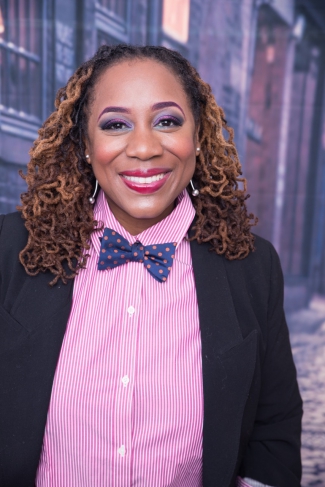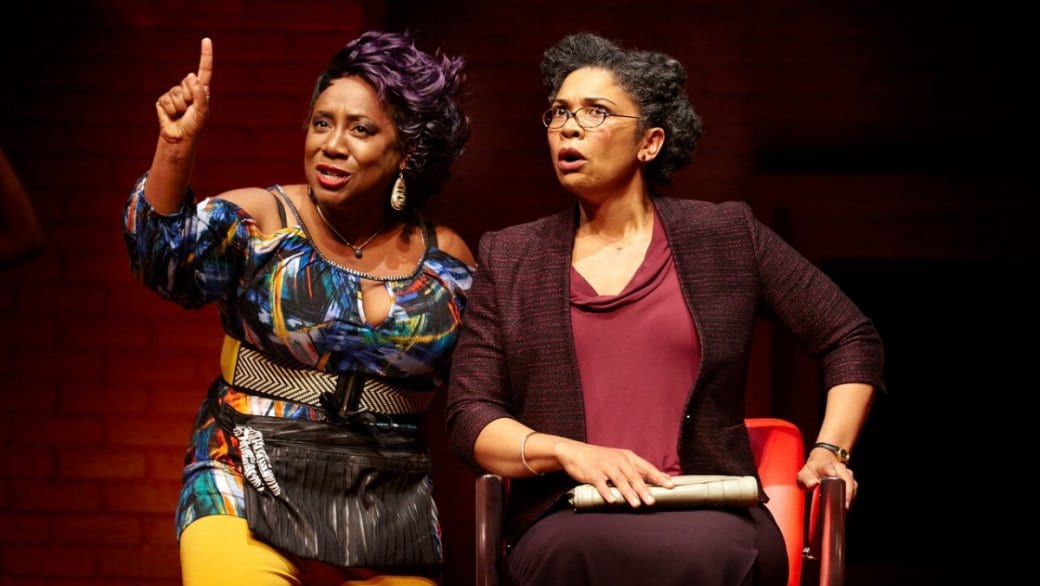‘da Kink in My Hair is one of our country’s rare theatrical success stories.
Queer playwright Trey Anthony’s 2001 saga of women sharing their traumas and triumphs in a north Toronto beauty salon catapulted her to near-immediate artistic superstardom.
Now, 15 years later, ‘da Kink continues to captivate audiences across Canada, the US and the United Kingdom. Just finishing performances in Calgary, the play will find its next home at the Ottawa’s National Arts Centre, starting Oct 19, 2016.
For such a theatrical heavyweight, the show was birthed in remarkably modest circumstances.
At the time she penned the script, Anthony was working overnights at a homeless shelter and had recently come out to her family. Needless to say, it didn’t go well.
“The level of homophobia I experienced was pretty intense,” she says. “I was feeling so low, suicidal at times. I began turning to my work as a way to cope. It became a form of therapy and a tool of salvation. I often joke ‘da Kink saved my life, but it’s really true.”

Anthony thought the script had audience potential, but she had little idea about how to produce a play. After a small showcase at the NOW café in Toronto, one of the actors suggested she take the script and apply for the Toronto Fringe Festival.
Not knowing anything about the event, Anthony initially misheard the name, and promptly replied, “But it’s not in French.”
She took a loan from her then-partner for the entry fee, assembled a team and threw a theatrical Hail Mary.
At the time, it was a radical artistic proposal. A show focused solely on the lives of black women was unheard of in Canada.
But the result was a smash unlike anything the Fringe had ever seen.
It was quickly snapped up by Theatre Passe Muraille, where it again broke box office records.
In 2005, it became the first Canadian play mounted by Mirvish Productions at the massive Princess of Wales Theatre, before touring to London, New York, San Diego and Atlanta.
Along with spawning a TV series, the show catalyzed the careers of celebrated artists Weyni Mengesha, Ngozi Paul, and d’bi.young anitafrika. And of course, it launched Anthony into the artistic stratosphere, at the same time it facilitated the dialogue she needed to have with her family.
“They’ve really come a long way,” she says. “My mom is really great and my dad is as well. With my grandmother, it was a bit more of a challenge . . . Eventually she got to a level of tolerance, but never really came around to acceptance.”
Art was key in her coming-out process, but Anthony says she still sees a lot of queer women of colour in Canada’s entertainment sector that feel they have to stay closeted.
“A few of us are out, but there’s still a lot of apprehension because people feel like it will hurt their career,” she says. “There’s the fear of not getting work or being typecast as the lesbian. Women of colour already struggle to get roles and almost never get cast as the love interest.”
“When you add sexuality to the career limitations already present, there’s a reason for people to be worried about their livelihoods, so they’re going to stay closeted to protect their bottom line.”
While Anthony has forged a path as a queer woman of colour in the theatre industry, it’s largely been laid by initiating her own projects.
In the spirit of her inaugural Fringe offering, she doesn’t wait around for producers to recognize her talents. She just does it herself.
Part of this is a much-needed tenacity in an industry where everyone is fighting for the same opportunities, but there’s also a destructive myth that keeps the kinds of stories she wants to tell from the stage.
“Producers think black audiences won’t come to the theatre,” she says. “When they’re presented as token characters, that’s the case. But when they’re represented authentically and spoken to in an authentic way, of course they will come.”
A behind-the-scene interview with Trey Anthony after a Calgary production of ‘da Kink.
TheatreCalgary/YouTube
Case in point: her most recent play, How Black Mothers Say I Love You.
She pitched it numerous places, but no one was interested in a story about a Jamaican-Canadian woman struggling with her mother’s inability to accept her queerness.
Undaunted, she pulled together the money for a production and had another instant hit on her hands. The show was subsequently picked up by Factory Theatre for its upcoming season.
“I don’t have time to be convinced of my worth,” she says. “I will tell these stories even if someone tells me not to. It comes down to a having a belief in your work and a level of arrogance. I was put on this earth to tell these stories. It’s my purpose in the world.”
‘da Kink in My Hair
Oct 19–Nov 5, 2016
National Arts Centre, 53 Elgin St, Ottawa


 Why you can trust Xtra
Why you can trust Xtra


